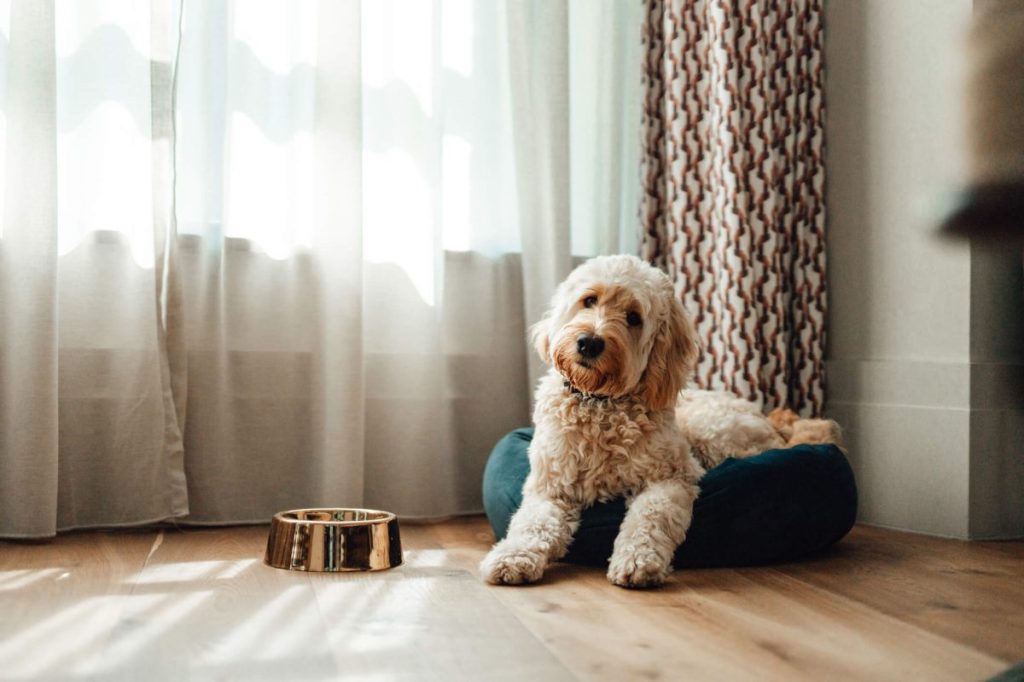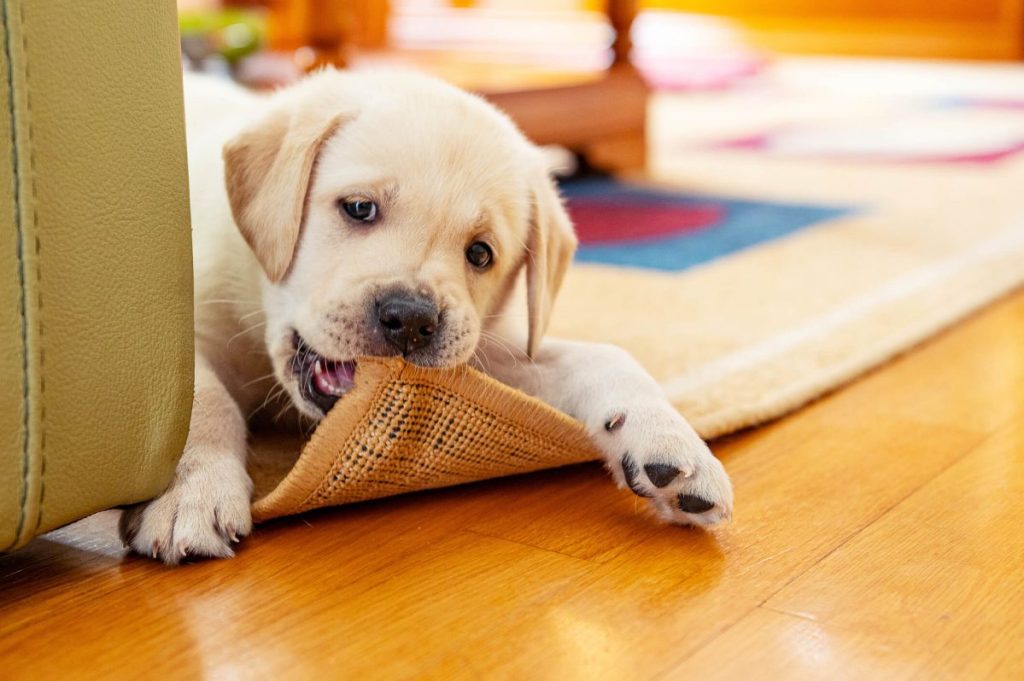Ever caught your dog sprawled out on your favorite chair, looking like they own the place? Maybe it’s time to give them a space they can truly call their own. Whether your pup needs a sanctuary from the hustle and bustle of daily life or a dedicated area for playtime and naps, designing the perfect dog room can greatly enhance their comfort and safety. A dog room is also a wonderful alternative to using a crate and provides an ideal space for puppies and dogs who are still getting used to their new home. Here’s how you can turn that spare room — or cozy nook — into a haven your furry friend will adore!
Creative ideas for a well-designed and functional dog room

Creating a dog room isn’t just about tossing a bed in a corner and calling it a day; it’s about understanding the unique needs and preferences of your pet. Every dog is different — some enjoy having a cozy, quiet corner to relax, while others might need ample space to play and stretch their legs. Consider your dog’s age, size, breed, and energy levels. A high-energy puppy or young dog might need more space to play and roam, while an older dog may appreciate a quieter, cozy environment. With that in mind, here are some tips to consider when setting up your dog’s room.
Choose the right location
The first step in creating a dog room is selecting the perfect spot. Ideally, you want a space that’s quiet and cozy but still within the heart of your home. Dogs are social animals; they want to feel included, even when they’re in their special space. Spare bedrooms, laundry rooms, or an unused corner of your living room can work well. If you live in a smaller home, even a corner nook can be transformed into a cozy dog sanctuary. Make sure it’s an area with good ventilation and natural light — your dog needs fresh air and sunlight just like you do.
Prioritize safety
Before you start decorating, ensure the room is safe for your dog. Remove any items that could be harmful if chewed on or ingested. Hide electrical cords and secure loose objects. If you have a puppy, puppy-proofing is essential as they’re prone to getting into everything. Consider using baby gates to section off areas that are off-limits.
Provide a cozy dog bed
A good night’s sleep is as essential for dogs as it is for humans. Investing in a high-quality dog bed can make a big difference. Look for beds that offer good support and are made from durable, washable materials. Memory foam or orthopedic beds are great for older dogs or those with joint issues.
For dogs who like to burrow or snuggle, consider beds with raised sides or cave-like designs. Place the bed in a quiet corner of the room, away from drafts and direct sunlight, to create a cozy and restful environment.
Set up a feeding and water station
Create a designated area for your dog’s food and water. Choose sturdy, non-slip bowls that are the right size for your pup. Stainless steel or ceramic bowls are often better than plastic ones, which can harbor bacteria and get easily chewed up. It’s also a good idea to place a mat under the bowls to catch spills and make cleaning easier. If your dog is large or has arthritis, consider an elevated feeding station as this can help reduce strain on their neck and joints. Furthermore, always ensure fresh water is available and regularly check the bowls to keep them clean.
Ensure the room is easy to clean
Accidents happen, especially with puppies or older dogs. Choose flooring that’s easy to clean, like tile, vinyl, or laminate. If you prefer carpet, opt for one that’s stain-resistant. You could also consider using washable area rugs or mats that can be easily thrown in the washing machine.
If needed, designate an area for your dog to go potty. This can include a potty pad or access to the outdoors with a doggy door to reduce mess. Be sure to spot-clean any messes with an enzymatic cleaner that is pet-safe. And, do a complete scrub of the room monthly.
Create a play area
Dogs need mental and physical stimulation, even when they’re in their room. Stock up on a variety of toys, from chew toys to puzzle toys that challenge their brain. A few interactive toys can keep your dog entertained when you’re not around. Consider installing a window perch if the room has a window, as many dogs love to watch the outside world.
Add storage solutions
Use storage bins and shelves to keep all of your dog’s essentials in one place. Think leashes, grooming tools, extra blankets, and their toy collection. Labeling the bins can make it easier to find what you need quickly. You can even get creative and use stylish storage solutions that blend seamlessly with your home décor.
Incorporate training tools
If you’re in the process of training your dog, their room can serve as a safe space for practicing commands and reinforcing positive behavior. Keep treats and training aids handy and spend time in the room together working on their skills. This can also help in building a positive association with the space.
Personalize the space
Much like us, dogs appreciate having personal items. Include things that smell like you, such as an old t-shirt or blanket. This can be especially comforting when they’re alone. Pictures, framed photos, or wall art of your dog can also add a charming touch.
Since some dogs can become anxious or stressed, consider incorporating calming elements. A white noise machine or soft music can help soothe them, especially during thunderstorms or fireworks. If your dog enjoys watching TV, you can even mount a small screen to play dog-friendly videos.
Don’t forget the tech
There are plenty of gadgets designed to make your dog’s life better. A pet camera can help you keep an eye on them while you’re away, and an automatic feeder can ensure they’re fed on schedule. Some high-tech toys even allow you to interact with your dog remotely.
Making your home safe and dog-proof

If you’re dedicating a room to your dog, it’s crucial to make the space dog-proof. This ensures your furry friend stays safe and sound while also protecting your belongings. Here are some dog-proofing tips to get you started:
- Stash away hazardous items: Keep cleaning supplies, medications, and any other toxic substances out of reach. Dogs are curious by nature, so you don’t want them getting into anything dangerous.
- Secure your trash: Invest in a sturdy, dog-proof trash can. Many dogs love to rummage through the garbage, and the last thing you want is a mess — or worse, an emergency trip to the vet.
- Hide electrical cords: Tuck away electrical cords or use cord protectors to prevent your dog from chewing on them. This not only keeps your pup safe but also protects your electronics.
- Store food securely: Make sure all food is stored in cabinets or containers that your dog can’t access. Some foods are toxic to dogs, and even non-toxic foods can upset their stomachs.
- Check for small objects: Dogs — especially puppies — love to explore with their mouths. Do a sweep for small items like coins, toys, rubberbands, or even buttons that could become choking hazards.
- Mind the plants: Some houseplants can be toxic to dogs. Make sure any plants are either out of reach or are safe for pets.
Once your dog’s room is set up, observe how they use the space and make adjustments as needed. Maybe they require more toys, a softer bed, or even a new arrangement. The key is to create a space that evolves with your dog’s needs. Most importantly, enjoy the process and have fun with it — after all, our pets are family and they deserve a special place in our homes, too.









